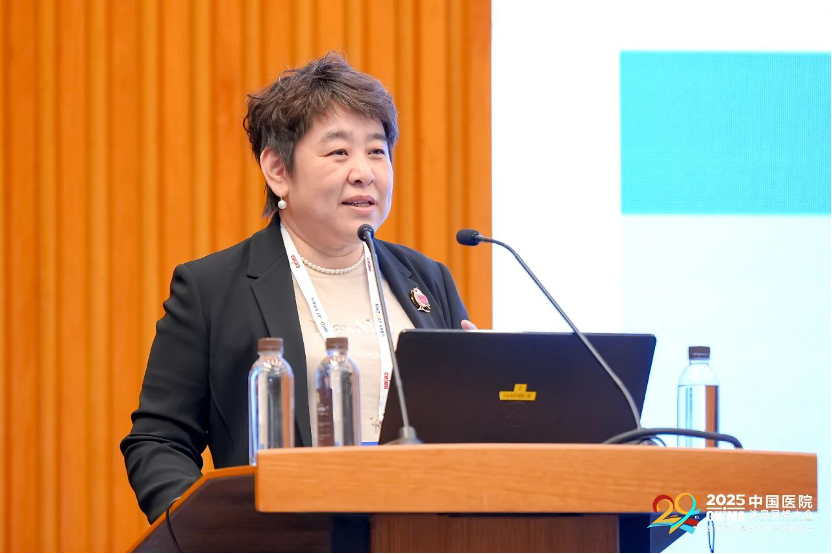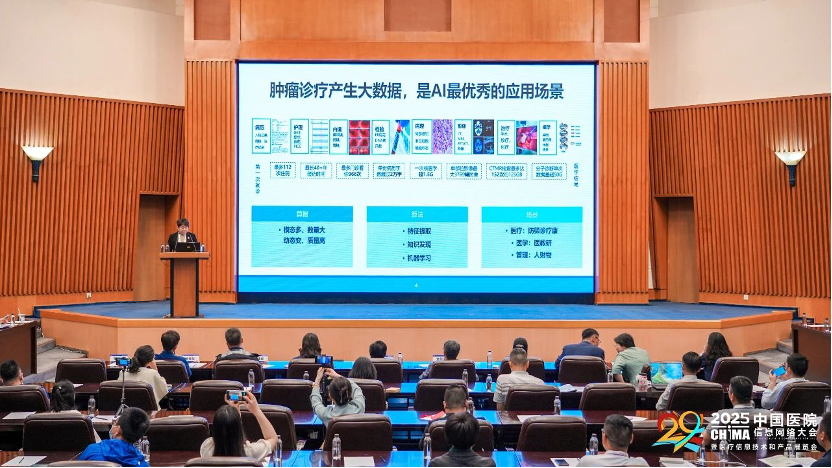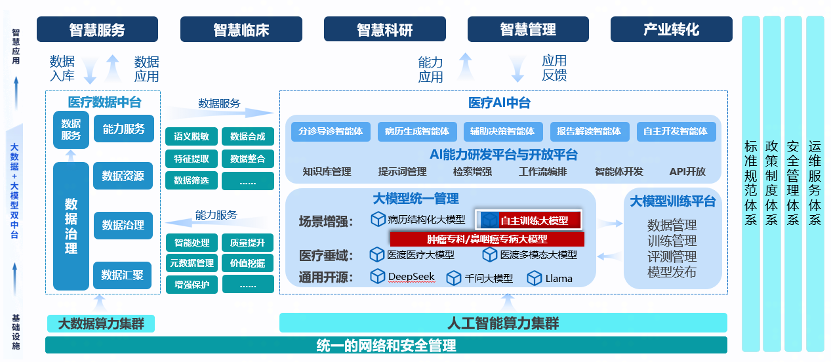Vice President Sun Ying Explains Sun Yat-sen University Cancer Center's Roadmap for Large Language Model Implementation: AI Empowers Oncology Diagnosis and Treatment to Enter a New Era of Intelligence
2025-05-26
At the recently held 29th China Hospital Information Network Conference (CHIMA 2025), Professor Sun Ying, Vice President of Sun Yat-sen University Cancer Center (SYSUCC), delivered a keynote speech titled "From Enthusiasm to Rationality: Practices and Reflections on Large Language Models in Oncology Diagnosis and Treatment." For the first time, she systematically shared the center's approach and phased achievements in the application of large language models. Collaborating with Yidu Tech, SYSUCC has anchored its technological path in clinical needs, built an intelligent foundation with high-quality data, and reconstructed diagnostic paradigms through human-machine collaboration, successfully establishing a comprehensive intelligent system covering the entire oncology diagnosis and treatment process. This has achieved breakthroughs in multiple scenarios, from data application to clinical decision support.

High-Quality Big Data: The Moat of Large Language Models
According to the latest report from the National Cancer Center, China recorded approximately 4.8 million new cancer cases in 2022 (accounting for about 24% of the global total), equating to over 13,000 new diagnoses daily, and approximately 2.6 million cancer-related deaths (exceeding 26% of the global total). The incidence and mortality rates remain the highest in the world, highlighting the severe challenges in cancer prevention and control. The Chinese government has placed great emphasis on cancer prevention and treatment. In response to the "Healthy China Action—Cancer Prevention and Control Implementation Plan (2023–2030)," which sets the ambitious goal of "achieving a five-year overall cancer survival rate of 46.6% by 2030," traditional diagnosis and treatment models urgently need breakthroughs.
Professor Sun Ying pointed out that oncology is an ideal field for AI applications—its multimodal (medical records, imaging, pathology, omics), highly dynamic (follow-up data for a single patient spanning up to 40 years), and large-scale (molecular diagnostic data exceeding 50GB per test) characteristics provide natural fuel for AI training. Additionally, the complexity of the oncology diagnosis and treatment chain, from prevention and screening to diagnosis, treatment, and rehabilitation, creates multi-layered AI application scenarios.

At the beginning of 2025, DeepSeek sparked a new wave of large language model applications. From top-tier hospitals to regional medical centers and grassroots institutions, a tiered penetration and ecosystem-driven trend has emerged. Professor Sun Ying shared that SYSUCC partnered with Yidu Tech during the Spring Festival and rapidly completed the localized deployment of the full-capacity DeepSeek-R1 671B large language model and Yidu AI middleware platform by February 27. The oncology-specific clinical assistant was integrated into the physician workstation, deeply incorporating core scenarios such as medical record generation and clinical decision support, achieving comprehensive coverage from standardized diagnosis and treatment processes to personalized needs.

"High-quality big data is the moat," emphasized Professor Sun Ying. Over the past decade, SYSUCC, leveraging Yidu Tech's core algorithm engine YiduCore, has built China's first T+0 real-time updated oncology big data platform, integrating over 50 business systems to create a dynamic "live map" of medical data covering the entire disease course of more than 2 million patients. In the past, this high-quality big data has deeply empowered clinical and research work at the hospital. The oncology-specific patient timeline has been embedded into more than 20 business systems, with daily access exceeding 45,000 visits. The hospital's 43 specific disease databases are queried over 2 million times annually, supporting 3,600 research projects cumulatively.
In the validation of the medical large language model's value, high-quality data has once again proven its irreplaceable anchoring role. Taking the TNM staging scenario as an example, general-purpose models require manual input of discrete data such as MRI, ultrasound, pathology, symptoms, and treatment history, whereas SYSUCC's clinical decision support assistant automatically links patient data to generate traceable staging recommendations aligned with authoritative guidelines.
Breaking Barriers in Clinical Intelligence: Scenario-Driven Solutions and Systemic Innovation
Professor Sun Ying detailed the practical experience of SYSUCC and Yidu Tech in overcoming the challenges of large language model implementation:
Challenge of Divergent Needs: Uniformly developed models or applications often struggle to meet the specialized depth required by oncologists or adapt to the scenario differences among physicians of varying seniority and roles. To address this, Yidu Tech helped SYSUCC launch the "My Smart Assistant" application, allowing doctors to independently select patient data and configure workflow logic based on their clinical experience, enabling them to build personalized AI agents as needed. This truly returns AI design authority to the clinical frontline. Within 60 days of its launch, over 100 clinical AI agents were rapidly developed, covering scenarios such as MDT collaboration and patient education, with the number of new agents continuing to rise daily.
Challenge of Model "Hallucination": Professor Sun Ying emphasized that "hallucination" is the most unacceptable flaw in medical applications. AI "hallucinations" in healthcare primarily stem from technical randomness, noisy training data, misleading human-computer interactions, and cognitive boundary ambiguity. To counter this, Yidu Tech's technical team constructed a three-tier prevention system—optimizing the training process through multi-level data cleaning and authoritative knowledge injection, enhancing reasoning rigor with logic verification chains and dynamic risk labeling systems, and establishing a multi-dimensional evaluation system to ensure factual accuracy and decision transparency, systematically mitigating "hallucination" risks.
For instance, traditional prompt-driven large language models in medical record generation faced issues such as fabricated data, slow speeds, context window overflow, and non-standard formatting. SYSUCC's intelligent medical record writing function can query complete patient records in real time and accurately extract diagnostic and treatment events based on Yidu Tech's disease knowledge graph, not only standardizing record-keeping and reducing errors but also cutting record generation time from five minutes to 30 seconds.
This anti-"hallucination" system has also been applied in clinical decision support scenarios. To address challenges commonly encountered in tumor TNM staging assessments—such as the filtering of multi-source heterogeneous data, medical complexity and generative bias, lack of decision traceability, outdated staging standards, and compatibility with multiple knowledge base versions—Yidu Tech has developed a decision-support assistant. By integrating tumor type identification, RAG (Retrieval-Augmented Generation) for domain knowledge expansion, chain-of-thought reasoning, and intelligent reflection workflows, the system enhances the professionalism and interpretability of decisions while reducing misjudgments.
Advanced Data Governance: To tackle the dual challenges of processing "large-scale, multi-type, full-dimensional" hospital data and meeting "precise, stable, and efficient" application demands, SYSUCC innovatively experimented with a dynamic context management solution based on hierarchical attention mechanisms. The customizable smart assistant application also allows users to determine data volume and scope based on scenario requirements.
Knowledge Evolution System: Medical knowledge evolves rapidly, but large language model training data is limited by time constraints, and new knowledge must be integrated with existing systems. SYSUCC addresses this through an internal-external dual-cycle approach: internally, it establishes a multi-layered knowledge base architecture that includes a core stable knowledge layer and a dynamically updated layer; externally, it leverages knowledge retrieval and enhancement technologies to enable the large language model to access the latest knowledge in real time.
Intelligent Patient Services: Regarding how to better serve patients using large language models, Professor Sun Ying mentioned that with a large language model–based medical assistant, patients can benefit from convenient features such as intelligent customer service, smart triage guidance, and report interpretation, thereby simplifying the medical consultation process. Additionally, the intelligent summarization of medical records and access to key health indicators help patients better understand their own health conditions. Personalized health education notifications further enhance patients’ sense of engagement and empowerment, enabling them to take a more active role in managing their health. These intelligent initiatives collectively aim to improve the patient experience and overall satisfaction.
Professor Sun Ying stated that in the future, SYSUCC will continue to collaborate with outstanding partners like Yidu Tech to deepen the application of multimodal large language models, strengthen data integration and intelligent analysis, and actively explore cutting-edge technologies to advance oncology diagnosis and treatment toward higher precision and personalization. Yidu Tech will also persist in technological innovation, expanding the application of large language models in diverse scenarios to translate cutting-edge achievements into tangible improvements in medical efficiency and patient experience, injecting sustained momentum into the intelligent transformation of healthcare. We have every reason to believe that with the support of AI technology, oncology diagnosis and treatment will enter a new era of intelligence, bringing more hope and well-being to patients.
本文为原创内容,仅供知识分享之目的,若存在侵权行为或疏漏,请与本平台联系,我们将及时处理。如需转载请后台留言,需征得本平台同意且注明来源转载。








